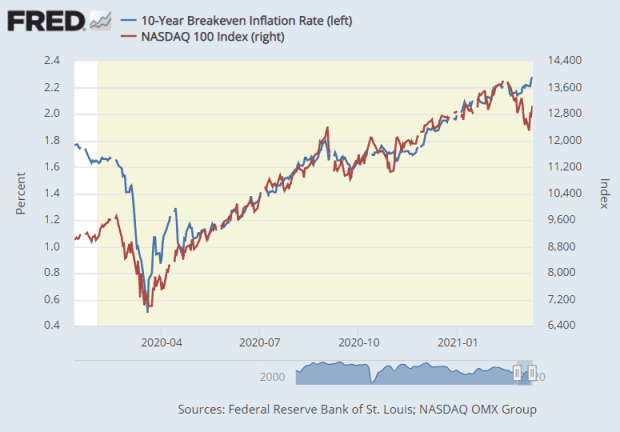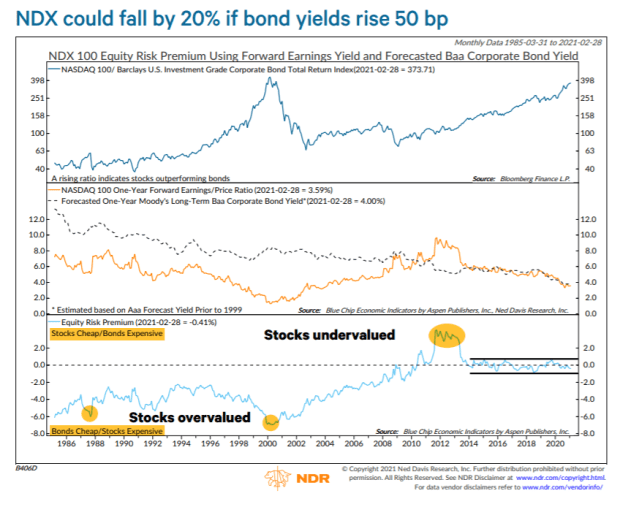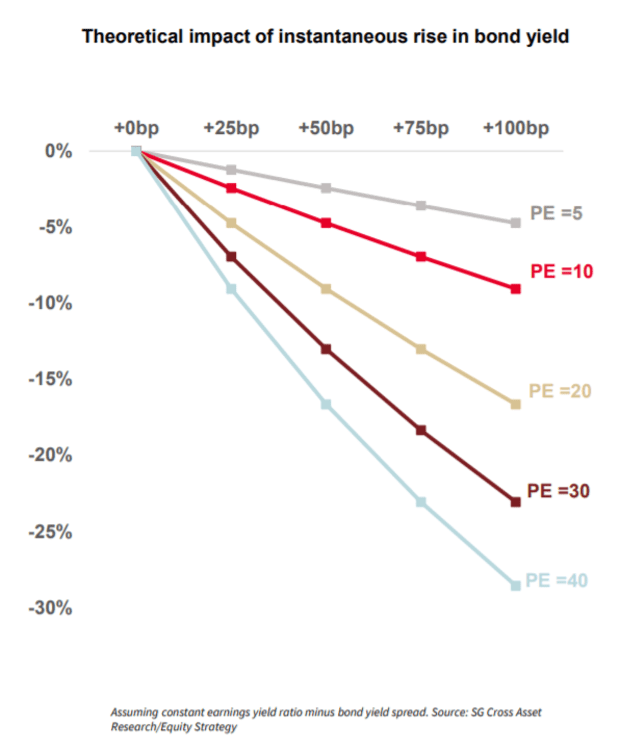This post was originally published on this site
In early Friday action, the yield on the 10-year Treasury was rising and Nasdaq 100 futures were falling.
That’s been the pattern over the last month. After a very close connection since the pandemic began, inflation-adjusted yields have kept climbing, but the Nasdaq 100 has suffered. That makes sense given the rich valuation tech stocks enjoy — when safe bonds offer more than crumbs as return, they present an investment alternative to stocks.

So analysts are now modelling just how far techs could fall if bond yields keep rising. Joe Kalish, chief global macro strategist at Ned Davis Research, says the Nasdaq 100 could fall 20% from its peak if the 10-year Treasury reaches 2%. (The index is already down 6% from its peak.)

Kalish’s calculation depends on other relationships holding steady. He says earnings yields and forecasted corporate bond yields have moved in tandem since 2014. A 2% 10-year Treasury would likely cause the bond yields on Baa-related bonds — the lowest investment-grade rating — to reach 4.5%, requiring a 20% drop in the Nasdaq 100 to keep that relationship consistent.

Strategists at French bank Societe Generale tend to agree. They’ve looked at the theoretical impact of a rise in bond yields, at different price-to-equity ratios. Given that the Nasdaq Composite is trading on 31.5 times earnings, according to FactSet data, the chart shows the impact could be steep.
That said, most notable is that Kalish remains bullish on stocks even with those risks. He looked at another measure of valuation, using Census Bureau data on cash-flow margins. “As cash flow has improved since the early 1990s and the cost of capital has fallen with interest rates, the economic margin has risen,” he writes. Right now, that margin is above its 5-year average. In the U.S., the firm is recommending small caps over large caps and value over growth.
The buzz
The $1,400 stimulus checks from the $1.9 trillion relief package signed into law by President Joe Biden could arrive as early as this weekend. Biden set a May 1 target for all adults to be eligible to receive vaccines.
Novavax NVAX, +8.77% will be in the spotlight after the biotech said a completed late-stage clinical study showed that its vaccine candidate was 96.4% effective against “mild, moderate, and severe disease caused by the original COVID-19 strain.” Thailand delayed the rollout of the AstraZeneca AZN, -2.29% vaccine, joining Scandinavian countries including Denmark, over blood clot concerns. Italy reportedly will impose a lockdown over the Easter weekend, according to wire service reports citing a draft decree.
China is planning ways to tame e-commerce giant Alibaba BABA, +2.77%, according to The Wall Street Journal. China also fined 12 tech companies including Baidu BIDU, +6.76% and Tencent 700, -4.41% for alleged antitrust violations.
Electronic signature company DocuSign DOCU, +5.90% topped revenue and earnings expectations for its latest quarter and delivered a better-than-expected outlook on those metrics.
Producer price and consumer sentiment data highlight the economics calendar.
The markets
The yield on the 10-year Treasury TMUBMUSD10Y, 1.594% rose as high as 1.61% — surprising analysts given the successful auction of bonds of that maturity earlier in the week.
Stock futures ES00, -0.27%, particularly on the Nasdaq 100 NQ00, -1.23%, slumped. Gold futures GC00, -1.11% fell by around $20 per ounce.
Random reads
There’s a bull market in twins — with the birth rate up by a third since the 1980s.
Scientists want to send 6.7 million sperm samples to the Moon as a global insurance policy.
Need to Know starts early and is updated until the opening bell, but sign up here to get it delivered once to your email box. The emailed version will be sent out at about 7:30 a.m. Eastern.
Want more for the day ahead? Sign up for The Barron’s Daily, a morning briefing for investors, including exclusive commentary from Barron’s and MarketWatch writers.

